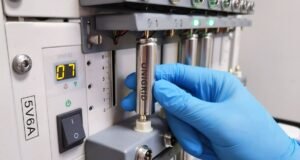The U.S. Commerce Department announced on Monday that it has reached an agreement with Taiwan Semiconductor Manufacturing (TSMC) to provide $6.6 billion in direct funding under the CHIPS and Science Act. This funding will be used to establish semiconductor factories in Phoenix, Arizona and also provide up to $5 billion in loans.
This significant grant, designated for TSMC’s U.S. subsidiary, TSMC Arizona, is a crucial move by the U.S. to strengthen its domestic supply of semiconductors as it aims to bring back chip manufacturing amid rising tensions between the United States and China.
Signed into law in 2022, the CHIPS Act has allocated a total of $280 billion towards advancing domestic chip research and production in the U.S., with $52 billion specifically set aside to support domestic chip manufacturing. In addition to national security concerns over the majority of semiconductors being produced in Asia, the U.S. is also highly motivated to diversify its production of semiconductors and bring more electronics manufacturing to the Western hemisphere. The Act’s main objective is to attract chip production to the U.S., and also prohibits recipients of the funding from expanding their semiconductor manufacturing presence in China.
TSMC, the world’s largest semiconductor producer, will utilize this new investment to expand its plans for fabrication plants in Arizona. The company has announced its intention to build a third fabrication unit in addition to the two currently being constructed, which will focus on manufacturing of chips with a 2-nanometer or more advanced process. Previously, TSMC had committed to investing approximately $40 billion in building plants in the U.S.
TSMC has revealed that its first fabrication unit is expected to begin producing chips using the 4nm process in the first half of 2025, with the second factory following suit in 2028 and producing 3nm and 2nm chips. The third plant is set to commence manufacturing of 2nm and even more advanced chips by the end of the decade.
This level of investment by TSMC represents more than $65 billion in total, contributing towards the company’s plans for its U.S. operations. In a statement, TSMC announced that this investment marks the largest direct investment by a foreign entity into a greenfield project in the United States.
TSMC’s Arizona division will supply chips to its U.S. clients, including major technology companies such as AMD, Apple, Nvidia, and Qualcomm. The company estimates that the three fabrication units will create approximately 6,000 highly skilled, well-paying jobs, as well as over 20,000 jobs in construction.
Last month, the White House also announced an agreement with the Department of Commerce to provide Intel with up to $8.5 billion in funding to bolster its U.S.-based manufacturing operations.
- Intel could receive up to $20 billion in grants and loans under the CHIPS and Science Act for its semiconductor production.
- Meanwhile, Samsung recently announced a $17 billion investment in Taylor, Texas, and is expected to secure over $6 billion in grants for its Texas chip facility.









[…] move is to be funded through the CHIPS and Science Act, with the aim of boosting domestic semiconductor production. But behind the excitement surrounding this announcement lies an unspoken concern of […]